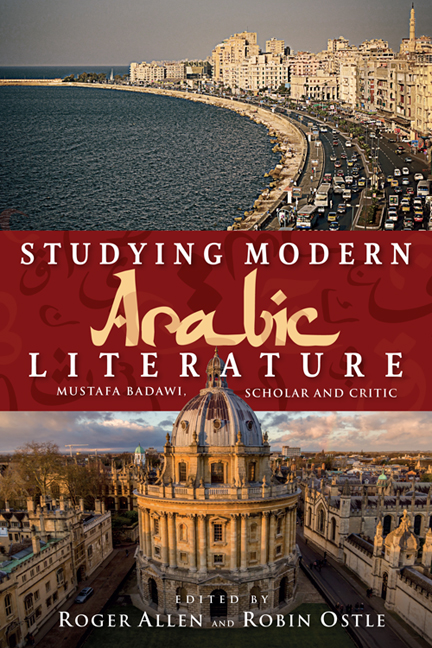Book contents
- Frontmatter
- Contents
- List of Figures
- Introduction
- Part I Alexandria to Oxford
- 1 The Cosmopolitan Alexandrian
- 2 Muhammad Mustafa Badawi in Conversation
- 3 Badawi: An Academic with a Vision. A Personal Testimony
- 4 From the Shadow Plays of Ibn Daniyal to the Poetry of Philip Larkin: Mustafa Badawi as Editor and Translator
- Part II The Academic Legacy
- Notes on the Contributors
- Index
3 - Badawi: An Academic with a Vision. A Personal Testimony
from Part I - Alexandria to Oxford
Published online by Cambridge University Press: 05 August 2016
- Frontmatter
- Contents
- List of Figures
- Introduction
- Part I Alexandria to Oxford
- 1 The Cosmopolitan Alexandrian
- 2 Muhammad Mustafa Badawi in Conversation
- 3 Badawi: An Academic with a Vision. A Personal Testimony
- 4 From the Shadow Plays of Ibn Daniyal to the Poetry of Philip Larkin: Mustafa Badawi as Editor and Translator
- Part II The Academic Legacy
- Notes on the Contributors
- Index
Summary
This chapter is primarily a personal testimony recording my interaction with Mustafa Badawi, and his contribution to the study of literature, both Arabic and English. I did not meet Mustafa in the classroom, like most of the contributors to this volume, yet learnt a lot from him and benefited from his generosity, warmth and compassion.
By a curious coincidence, the day I returned to Oxford to take part in a colloquium commemorating his life and work was the fortieth anniversary of my arrival in Oxford for the first time in March 1973, thanks to Mustafa Badawi's insight and initiative. I was a young Egyptian critic then, who at the time thought of travelling to the West only in my dreams, and through the European novels I avidly read. I spent my late teens and early twenties, first in a small town in the Nile Delta, then in Cairo, devouring Western literature, particularly Russian novels of the late nineteenth and early twentieth centuries, and living more in the fictive world they constructed than in the real world around me. During my university years, I befriended another avid reader of Russian novels, the late short-story writer Abdulla Khayrat, and we lived in the world they created and developed our own language, in which quotes from the novels took on real life such as ‘I need a glass of vodka or a bowl of cabbage soup’, or, when either of us was short of money, ‘give me a kopek for Christ's sake’. So coming to Oxford, at the behest of Mustafa, was a fulfilment of an almost impossible, yet long-cherished dream.
I had known of Mustafa Badawi ten years before I actually met him, in fact since I started to play an active role in the Arab literary field as a young critic. The publication in 1962 of his Arabic translation of I. A. Richards's Principles of Literary Criticism (1924) coincided with the publication of my first article of literary criticism in Al-Adab. Although it appeared in Arabic forty years after its publication in English, the translation of this seminal book presented a rupture with the predominant critical discourse of cliched socialist realist criticism and narrow Arabic understanding of Jean-Paul Sartre's concept of commitment.
- Type
- Chapter
- Information
- Studying Modern Arabic LiteratureMustafa Badawi, Scholar and Critic, pp. 33 - 54Publisher: Edinburgh University PressPrint publication year: 2015



